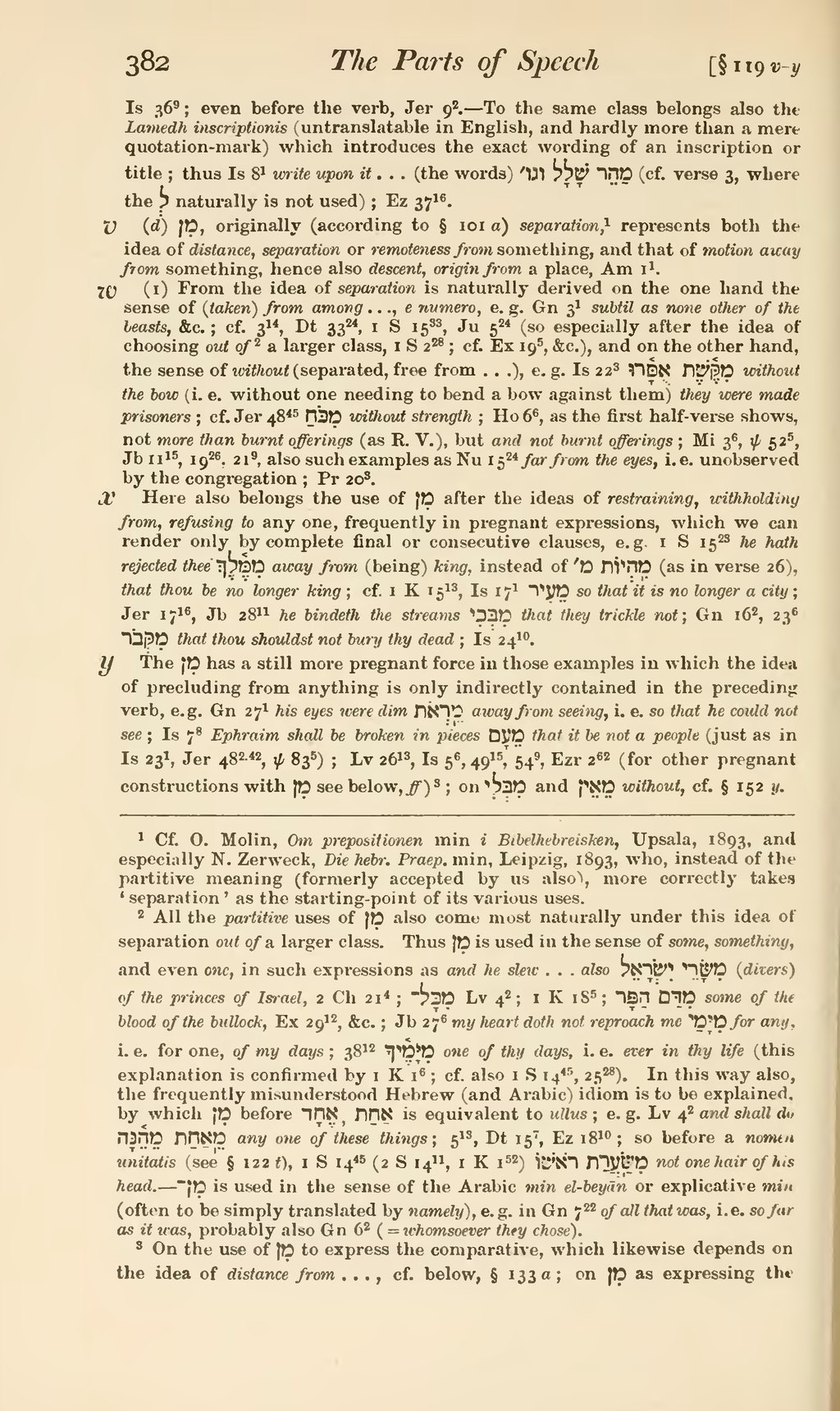Is 36; even before the verb, Jer 9.—To the same class belongs also the Lamedh inscriptionis (untranslatable in English, and hardly more than a mere quotation-mark) which introduces the exact wording of an inscription or title; thus Is 8 write upon it... (the words) מַהֵר שָׁלָל וגו׳ (cf. verse 3, where the לְ naturally is not used); Ez 37.
[v] (d) מִן, originally (according to § 101 a) separation,[1] represents both the idea of distance, separation or remoteness from something, and that of motion away from something, hence also descent, origin from a place, Am 1.
[w] (1) From the idea of separation is naturally derived on the one hand the sense of (taken) from among..., e numero, e.g. Gn 3 subtil as none other of the beasts, &c.; cf. 3:14, Dt 33, 1 S 15, Ju 5 (so especially after the idea of choosing out of[2] a larger class, 1 S 2; cf. Ex 19, &c.), and on the other hand, the sense of without (separated, free from...), e.g. Is 22 מִקֶּ֫שֶׁת אֻסָּ֫רוּ without the bow (i.e. without one needing to bend a bow against them) they were made prisoners; cf. Jer 48 מִכֹּחַ without strength; Ho 6, as the first half-verse shows, not more than burnt offerings (as R.V.), but and not burnt offerings; Mi 3, ψ 52, Jb 11, 19, 21, also such examples as Nu 15 far from the eyes, i.e. unobserved by the congregation; Pr 20.
[x] Here also belongs the use of מִן after the ideas of restraining, withholding from, refusing to any one, frequently in pregnant expressions, which we can render only by complete final or consecutive clauses, e.g. 1 S 15 he hath rejected thee מִמֶּ֫לֶךְ away from (being) king, instead of מִֽהְיוֹת מ׳ (as in verse 26), that thou be no longer king; cf. 1 K 15, Is 17 מֵעִיר so that it is no longer a city; Jer 17, Jb 28 he bindeth the streams מִבְּכִי that they trickle not; Gn 16, 23 מִקְּבֹר that thou shouldst not bury thy dead; Is 24.
[y] The מִן has a still more pregnant force in those examples in which the idea of precluding from anything is only indirectly contained in the preceding verb, e.g. Gn 27 his eyes were dim מֵֽרְאֹה away from seeing, i.e. so that he could not see; Is 7 Ephraim shall be broken in pieces מֵעָם that it be not a people (just as in Is 23, Jer 48, 42, ψ 83); Lv 26, Is 5, 49, 54, Ezr 2 (for other pregnant constructions with מִן see below, ff)[3]; on מִבְּלִי and מֵאֵין without, cf. § 152 y.
- ↑ Cf. O. Molin, Om prepositionen min i Bibelhebreisken, Upsala, 1893, and especially N. Zerweck, Die hebr. Praep. min, Leipzig, 1893, who, instead of the partitive meaning (formerly accepted by us also), more correctly takes ‘separation’ as the starting-point of its various uses.
- ↑ All the partitive uses of מִן also come most naturally under this idea of separation out of a larger class. Thus מִן is used in the sense of some, something, and even one, in such expressions as and he slew... also מִשָּׂרֵי יִשְּׂרָאֵל (divers) of the princes of Israel, 2 Ch 21; מִכָּל־ Lv 4; 1 K 18; מִדַּם הַפָּר some of the blood of the bullock, Ex 29, &c.; Jb 27 my heart doth not reproach me מִיָּמַי for any, i.e. for one, of my days; 38:12 מִיָּמֶ֫יךָ one of thy days, i.e. ever in thy life (this explanation is confirmed by 1 K 1; cf. also 1 S 14, 25). In this way also, the frequently misunderstood Hebrew (and Arabic) idiom is to be explained, by which מִן before אֶחָד, אַחַת is equivalent to ullus; e.g. Lv 4 and shall do מֵֽאַחַת מֵהֵ֫נָּה any one of these things; 5:13, Dt 15, Ez 18; so before a nomen unitatis (see § 122 t), 1 S 14 (2 S 14, 1 K 1) מִשַּֽׂעֲרַת רֹאשׁוֹ not one hair of his head.—מִן־ is used in the sense of the Arabic min el-beyān or explicative min (often to be simply translated by namely), e.g. in Gn 7 of all that was, i.e. so far as it was, probably also Gn 6 (=whomsoever they chose).
- ↑ On the use of מִן to express the comparative, which likewise depends on the idea of distance from..., cf. below, § 133 a; on מִן as expressing the distance of time from a fixed limit, in the sense of after, e.g. ψ 73 מֵהָקִיץ after awaking (cf. ἐξ, ἀρίστου, ab itinere), or after the lapse of..., e.g. Gn 38, Ho 6, and very frequently מִקֵּץ from the end of, i.e. after the lapse of..., see the Lexicon; also for the use of מִן to represent resting beside anything, like the Latin prope abesse ab...
